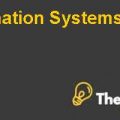
Financial statements before and after the conversion after the revelations of fraud. "Hide
by David F. Hawkins, Suraj Srinivasan, Akiko Kanno Source: Harvard Business School 16 pages. Publication Date: January 14, 2011. Prod. #: 111038-PDF-ENG
KANEBO LTD (B)
Introduction:
When one firm holds controlling interest in the other firm, the procedure can complex the duty of making the financial statements. Even if one company ‘owns’ the other company, both the enterprises often stay separate legal entities, with each accountable for its own bookkeeping. At the time to report the results, consolidated financial statements and stand-alone statements provide duel ways of judging at the companies’ performance.
Kanebo Ltd was supposed to consider its subsidiaries this way too, but it played a game to show the company’s financial statements strong. For this it eliminated the loss making subsidiaries from its books, and presented parent-only financial statements to the stakeholders. This is a fraudulent accounting activity, continuously conducted by Kanebo since many years. In this report we will analyze why the as reported parent company only balance sheet’s balances differ from the restated parent company only balance sheet. We will discuss why Kanebo’s as reported parent only financial statements are different from consolidated financial statements. And we will also discuss the usefulness of parent’s company only financial statements.
Problem Statement:
• Why Kanebo’s as reported parent company only 1999-2004 balance sheet balances (Exhibit 1) differ from the restated parent-company only 199-2004 balance sheets balances (Exhibit 2).
• Why the financial information in Kanebo’s as reported 1999-2004 consolidated financial statements (Exhibit 3) differs from the restated 1999-2004 consolidated financial statements (Exhibit 4).
• Putting aside the fraud, as an investor in Kanebo’s common stock, how useful to you are the company’s parent company only financial statements?
Analysis / Results:
Why Kanebo’s as reported parent company only 1999-2004 balance sheet balances differ from the restated parent-company only 199-2004 balance sheets balances.
The Unsalable Inventory
The first difference was due to the unsalable inventory, which Kanebo’s as reported parent company only balance sheet did not had. This affected the inventory under current assets.
The unsalable food stock
Kanebo food sales Co. had expired food products, these food stocks were not incorporated to add the impact of write-off of expired food products.
Removal of subsidiaries
Almost 15 subsidiaries had been intentionally removed from the financial statements. This means that the other components that should be added in the parent balance sheet were not be incorporated in the balance sheet. And this is also the reason for different balances.
Equity and cost method
Some subsidiaries used cost method of accounting and the others used equity method of accounting. This created difference in both the balance sheets, and both the methods used give result in different numbers. The incorrect accounting increased company’s net worth. This affected the shareholders equity in the balance sheet...
This is just a sample partial case solution. Please place the order on the website to order your own originally done case solution.













